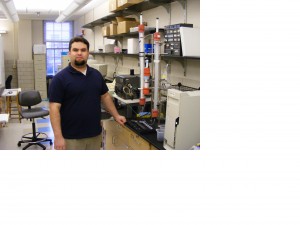
Matthew Whitley
Academic Research Scientist
Department of Biochemistry & Biophysics
University of North Carolina at Chapel Hill
Department of Structural Biology
University of Pittsburgh
Education and Qualifications:
Ph.D., Biochemistry (Molecular & Cellular Biophysics Option), 2010
University of North Carolina at Chapel Hill
B.S., Chemistry (Biophysical Option), 2004
B.A., German, 2004
University of Arkansas at Fayetteville
Study Abroad, Karl-Franzens-Universität, Graz, Austria, 2002-2003
Zentrale Oberstufenprüfung, Goethe-Institut, 2004
Describe a typical day on your job.
There is no one typical day. The morning usually starts with performing experiments at the lab bench, followed by data analysis by hand or using the computer. The day usually concludes with data interpretation as the experiments are completed and planning for the next day’s work. Scattered throughout are my efforts to keep up with the latest scientific literature from major research centers all over the world and correspondence with research collaborators and other coworkers.
How do you use German?
Modern science is truly a global endeavor. While it is remains generally true that the United States leads the way in the high-tech science and engineering fields, the gap has decreased noticeably in recent decades. Germany is without doubt a modern scientific powerhouse, with many well-respected academic and governmental research facilities such as the renowned Max Planck Institutes and the Helmholtz Society research centers. I have used my German skills to read scientific and technical web pages and journal articles, and I have communicated with colleagues by email in German. I attended a scientific conference in Beijing, China, and was able to use my German skills to communicate with scientists hailing from several different European countries. In general, my knowledge of German grants me access to people, materials, knowledge, and expertise that would not be as readily available to me were I restricted solely to English-language sources.
What are the advantages and disadvantages of your job?
The biggest advantage of my job is that I am contributing to the acquisition of new knowledge relevant to challenging biomedical problems and questions. I routinely use cutting-edge scientific instruments and am responsible for the entire content of a project including experimental design, data acquisition and processing, and data interpretation. This gives me a large amount of control over what I work on and how I go about it. Because science has truly become a worldwide enterprise, I get to interact with fellow researchers from all over the world.
The disadvantage of a career as an academic research scientist is the extremely long period of education and intense work required for such a career (a minimum of 4 years as an undergraduate, 5-6 years as a graduate student, and 4-5 years as a postdoctoral research fellow before one is fully qualified to lead one’s own lab). Salary and benefits are low for graduate students and postdocs (compared to colleagues in private business and industry who have a similar or even lesser amount of education). Because of these drawbacks, a person should only pursue such a career if he or she can view the pursuit of new and useful knowledge as its own reward.
Do you have any advice for someone who would like to enter your field?
Science is no longer done in isolation, and scientists who know only English have limited themselves right from the start to a small fraction of the total body of available knowledge and expertise. Because of the rich history of scientific inquiry in Germany and Austria, German is a fantastic language to know if you plan to enter any scientific or technical field. What’s more, being able to communicate in a foreign language is fun!